What can the student 10-11 class and the future of the IT community in our country
Welcome dear IT society Habra!
Take 30 seconds of your time and think about the names of these projects:
the
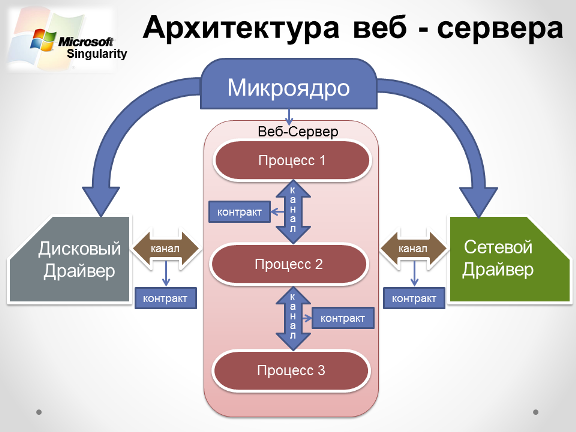
All this — the scientific projects of the Russian school students of 10-11 class.
Immediately in this difficult to believe, but true.
In this post I want to tell:
the
We have in the country competitions, which help talented students to achieve their potential and support the work on such projects.
One of these competitions mentioned Habra the Baltic scientific and engineering competition.
The event annually gathers in St. Petersburg more than 300 schoolchildren from all over Russia and is a qualifying stage for the international contest of young scientists Intel ISEF in the US, which very cool.
In this post we speak about the Baltic contest. Of course, today in grades 10-11 student can participate in a huge variety of Olympiads, contests and competitions. To understand why the Baltic contest are worthy of a separate post on Habre, it is enough to look at examples of projects from past years:
the
In this project the student of the 10th class...
Presentation of the project for competition in Russia:
The project's stand at the international exhibition of Intel of ISEF:
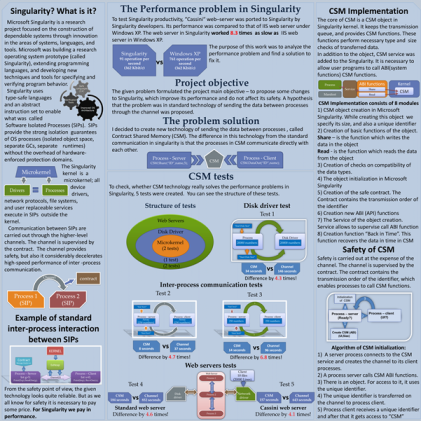
(click to enlarge)
A report about the student in the news:
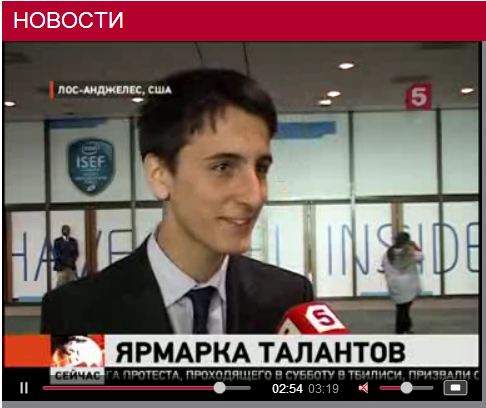
the
In this project, the student of grade 11...
Stand project for competition in Russia:
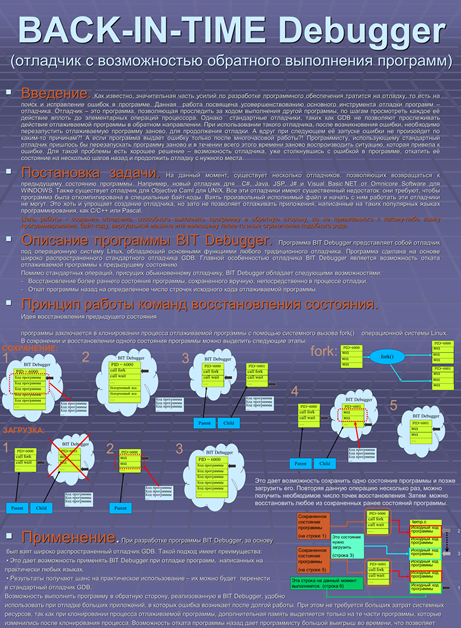
(click to enlarge)
The project's stand at the international exhibition of Intel of ISEF:
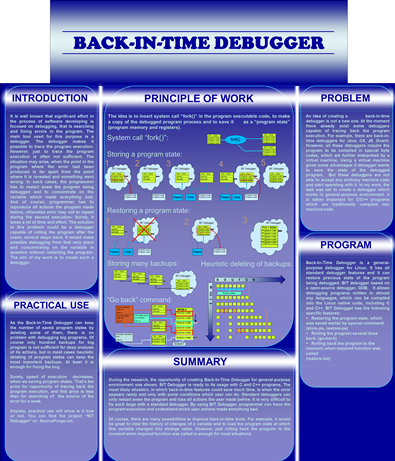
(click to enlarge)
the
In this project, the student of grade 11...
The project's stand at the international exhibition of Intel of ISEF:
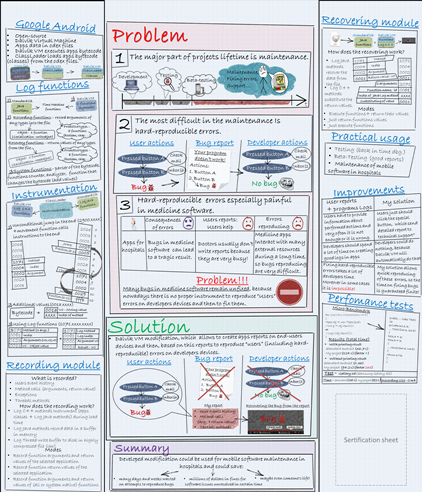
(click to enlarge)
The above 3 projects selected only because I am familiar with students that these projects do. (by the way, "students", of course, are no longer students. One "student" at the time of writing this post has created from scratch an IT company developing in St. Petersburg, a software product that exceeds all existing European counterparts and is already sold in the CIS and three European countries). Well and, of course, was chosen pretty serious Computer Science projects that could be interesting to Habra-community.
In the Baltic competition projects not only in the sections Computer Science and not only similar level of complexity. The competition can be seen as "app-trainer of English language for children on flash" from a 9th grader from the village of Baranovichi, and "universal distributed password cracker" from student of grade 11 from Peter (by the Way, this "student" has also long been a student: in my humble opinion, is one of the coolest professionals Peter on computer security and writes here are the most useful articles on habré).
In addition to Computer Science, in other sections it is possible to meet mass of the strong operations — here, for example, a few names from last year:
other projects:
the
List of works by winners of the 2013 competition can be viewed here.
Here you can see a great report from the contest in 2010, with sample projects and photos.
the
Baltic contest — all Russia. For students from the province the opportunity to speak to scientific jury and to communicate with peers is especially important, as houses these guys have such opportunities is almost no. Travel expenses to St. Petersburg and stay for many families is a significant problem.
For this reason, such expenses by the organizers of the competition decided to take on. (the organizer of the contest — one of the mathematical schools of St. Petersburg)
In any normal country, of course, such events must be sponsored by a government.
Alas, in 2014 the Baltic contest has not received financial support from Russian officials.
Briefly, "algorithm":
Here there are conditional, Ivan Ivanov, student of 10th grade from the city of Chelyabinsk.
While all friends of Ivan play World Of Tanks or drinking beer in the entrance, Ivan was fond of programming and want to develop a modification of the Dalvik VM to debug Android applications easier.
Ivan wants to go to St. Petersburg for a contest to the result of his sleepless nights are appreciated by the professionals of the IT industry, but his family has no extra 10, 000 to provide the trip.
Today, alas, our officials are not willing to help Ivan.
the
It is important to understand the fundamental difference between the Baltic contest and the like from various programming competitions.
At the Olympic games on programming:
the
In the Baltic competition:
the
No no! The Olympics is also good. Science project is just another.
Why is "more" important to us? More on that later.
the
I think many community members have a dream of the "bright future" in which the country where we were born and wrote his first "Hello World" is not a "raw material appendage" and a world leader in innovation. When more than 50% of the posts TechCrunch — not about the office of Silicon Valley, and about our startups.
There is no doubt that the main component of success for such a "bright future" is the company which developed something new and complex. In turn, such companies were, we need people who are able to develop something new and something complex.
Just imagine two students of 1 course. One in the 11th grade, trained on hundreds of Olympiad tasks and the other one in that time did one major project for the Baltic contest.
Which of the two students would you take an internship in an experimental innovation project in your company?
Which of the two students are more likely to become CTO in the "next Google" appearance which we all waiting for?
I think the answer is obvious.
Real software projects that change the world is usually not Olympiad puzzles, where you have 10 minutes in emergency mode something to code. In real projects we spend hours studying the specifications, think through complex architecture, understand someone else's code etc.
how Important is IT to our community to pay attention to the contests that are born experts, able to create something new and challenging?
In my opinion, is a must. Otherwise one day we will Wake up and find that all 50 candidates for a job for our super-project-which-needs-change-the world is only capable of something primitive and single. And then all together let us fleerusk to write here are the posts on habré about "staff shortages".
If a respected member of the IT community Habra, reading this post will agree with this statement to him, I'll just leave it here link to the crowdfunding project page, where until January 16, you can support one of these competitions. (by the way, this post is in the hub "Crowdfunding", which, in theory, allows such a reference to place)
the
I want to finish on a positive note.
1. Who from Peter — February 5, 2014 at 16: 00 come to the Exchange line 6 to see the projects of students in the Baltic competition. Believe me, the students it is essential that YOU appreciated their work and gave feedback.
2. I really hope that written in my post you will find the response at dear Habra-community and together we will build a country in which conventional Ivan from Chelyabinsk will become the basis for the "bright future" in which our country is respected as a world leader in innovative IT developments.
It will not be easy, but "the road will overcome the walking".
Well, that's finally motivating picture of the author of one of the projects, which were discussed in an earlier post:
(photo taken in USA during the final of the contest Intel ISEF)
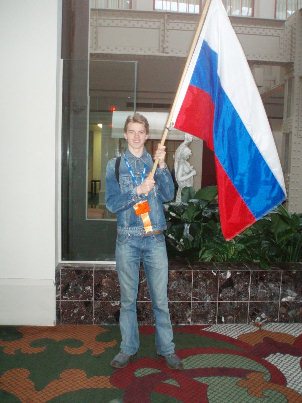
Article based on information from habrahabr.ru
Take 30 seconds of your time and think about the names of these projects:
the
-
the
- the Technology of Contract Shared Memory in OS of Microsoft Singularity the
- Back-In-Time Debugger: a debugger under Linux with possibility of recovery of the previous state of the program being debugged the
- Modification of Dalvik VM for beta testing of Android-applications with possibility of playback of custom actions

All this — the scientific projects of the Russian school students of 10-11 class.
Immediately in this difficult to believe, but true.
In this post I want to tell:
the
-
the
- where in Russia there are students with such projects and where such projects can be viewed; the
- as with all of this, in my opinion, depends the future of the IT community in our country; the
- that every member of this community can to do to the future it has become such that we want to see him.
About the good competition of scientific projects for students
We have in the country competitions, which help talented students to achieve their potential and support the work on such projects.
One of these competitions mentioned Habra the Baltic scientific and engineering competition.
The event annually gathers in St. Petersburg more than 300 schoolchildren from all over Russia and is a qualifying stage for the international contest of young scientists Intel ISEF in the US, which very cool.
In this post we speak about the Baltic contest. Of course, today in grades 10-11 student can participate in a huge variety of Olympiads, contests and competitions. To understand why the Baltic contest are worthy of a separate post on Habre, it is enough to look at examples of projects from past years:
the
Example project # 1: Technology of Contract Shared Memory in OS of Microsoft Singularity
In this project the student of the 10th class...
-
the
- Took Microsoft's Singularity experimental OS, Microsoft the
- Proanalizirovan system performance for some tasks the
- has Proposed a more efficient way of working with memory the
- Implemented this, ran tests, summed up the
- Presented the work at the Baltic contest, won a trip to America. the
- represents Russia in America at the international competition Intel ISEF, is the winner (2nd place).
Presentation of the project for competition in Russia:
The project's stand at the international exhibition of Intel of ISEF:

(click to enlarge)
A report about the student in the news:

the
Example project # 2: Back-In-Time Debugger: a debugger under Linux with possibility of recovery of the previous state of the program being debugged
In this project, the student of grade 11...
-
the
- just4fun Developing a toy in C++, recognized all the “delights” of debugging. Especially those moments when the cause of the error is somewhere over 10,000 lines to the point where the issue really appeared. (for example, memory is “made” 3 minutes ago and Segmentation Fault it happened just now when I tried to appeal to the bruising memory) the
- Invented to make the debugger with the possibility to rollback the program to a previous state and thus to learn easy to fix hardly-reproducible bugs. the
- based on the source code of the open source debugger GDB. Gathered under Cygwin. the
- for 6(!) months tried unsuccessfully to implement the idea under Windows. the
- Made customized GDB version with additional functions such as "restore program state", laid code on SourceForge. the
- Presented the work at the Baltic contest, won a trip to America. the
- represents Russia in America at the international competition Intel ISEF, was the winner (4th place).
Stand project for competition in Russia:

(click to enlarge)
The project's stand at the international exhibition of Intel of ISEF:

(click to enlarge)
the
Sample project No. 3: Modification of Dalvik VM for beta testing of Android-applications with possibility of playback of custom actions
In this project, the student of grade 11...
-
the
- for the Sake of interest began to develop mobile applications for Android the
- In the process of developing faced with the problem that if someone of my friends who are playing with the app, the app suddenly crashes, the situation is sometimes quite difficult to reproduce and no you cannot use the debugger. the
- Inspired by a project of a countryman about Back-In-Time debugger. Decided to do something similar for Android applications. the
- did modification Dalvik VM (java virtual machine used in Android) in which the byte code of the application under test automatically inserts code that records system events and user actions. the
- has Developed a "player" which allows for thus created a special log file to 'lose' a life of the app, which came from a beta tester. Of course, it is possible to use the debugger. the
- Presented the work at the Baltic contest, won a trip to America. the
- represents Russia in America at the international competition Intel ISEF. The main prize is not won, but received good prizes.
The project's stand at the international exhibition of Intel of ISEF:

(click to enlarge)
Other projects
The above 3 projects selected only because I am familiar with students that these projects do. (by the way, "students", of course, are no longer students. One "student" at the time of writing this post has created from scratch an IT company developing in St. Petersburg, a software product that exceeds all existing European counterparts and is already sold in the CIS and three European countries). Well and, of course, was chosen pretty serious Computer Science projects that could be interesting to Habra-community.
In the Baltic competition projects not only in the sections Computer Science and not only similar level of complexity. The competition can be seen as "app-trainer of English language for children on flash" from a 9th grader from the village of Baranovichi, and "universal distributed password cracker" from student of grade 11 from Peter (by the Way, this "student" has also long been a student: in my humble opinion, is one of the coolest professionals Peter on computer security and writes here are the most useful articles on habré).
In addition to Computer Science, in other sections it is possible to meet mass of the strong operations — here, for example, a few names from last year:
other projects:
the
-
the
- Yoneda Algebra one of the special biserial algebras the
- a New type of layered double hydroxide of Nickel for use in hybrid supercapacitors
- the Study of methods of selection of Mytilus Edulis and Mytilus Trossulus of mussels of the little stint magpie (Haemotopys Ostralegus) mussels of types in territory of the Kandalaksha nature reserve island Raikov
on the cohomology of p-groups of manual types of views the
List of works by winners of the 2013 competition can be viewed here.
Here you can see a great report from the contest in 2010, with sample projects and photos.
the
a Small spoon a Couple of barrels of tar about the funding competition, which simply can not say
Baltic contest — all Russia. For students from the province the opportunity to speak to scientific jury and to communicate with peers is especially important, as houses these guys have such opportunities is almost no. Travel expenses to St. Petersburg and stay for many families is a significant problem.
For this reason, such expenses by the organizers of the competition decided to take on. (the organizer of the contest — one of the mathematical schools of St. Petersburg)
In any normal country, of course, such events must be sponsored by a government.
Alas, in 2014 the Baltic contest has not received financial support from Russian officials.
Briefly, "algorithm":
-
the
- Committee on science is not engaged in the students the
- Committee on education in science
- goto 1
the Committee on youth policy is not engaged in any science or students, their path events
the Governor directed the letters again to the Committee on science the
Here there are conditional, Ivan Ivanov, student of 10th grade from the city of Chelyabinsk.
While all friends of Ivan play World Of Tanks or drinking beer in the entrance, Ivan was fond of programming and want to develop a modification of the Dalvik VM to debug Android applications easier.
Ivan wants to go to St. Petersburg for a contest to the result of his sleepless nights are appreciated by the professionals of the IT industry, but his family has no extra 10, 000 to provide the trip.
Today, alas, our officials are not willing to help Ivan.
the
the Specifics of research projects, unlike programming competitions
It is important to understand the fundamental difference between the Baltic contest and the like from various programming competitions.
At the Olympic games on programming:
the
-
the
- is Given a task that is already 100% decided before you "clever uncles"; the
- Problem to be solved in 10 minutes, the student needs to think very quickly, quickly "put out fires"; the
- code Quality doesn't matter. The main thing — to send to the test file (the one that "task3NewNewNewFinallyWorks.cpp") to get the coveted "Accepted"; the
- Uses only the basic elements of the language: arrays, strings, pair of standard algorithms.
In the Baltic competition:
the
-
the
- is Given a task with "open end". Nobody really knows what will happen in the end and if it will work at all; the
- the Task cannot be accomplished in 10 minutes. The task is difficult and usually is done a year; the
- the result of the work of the student is a full — featured software product. The student is forced to learn to write the project code correctly, carefully consider the architecture; the
- Student "smokes" 1,000 addicts to understand complex technologies, and in 90% of cases this is English.
No no! The Olympics is also good. Science project is just another.
Why is "more" important to us? More on that later.
the
About the future of the IT community in our country
I think many community members have a dream of the "bright future" in which the country where we were born and wrote his first "Hello World" is not a "raw material appendage" and a world leader in innovation. When more than 50% of the posts TechCrunch — not about the office of Silicon Valley, and about our startups.
There is no doubt that the main component of success for such a "bright future" is the company which developed something new and complex. In turn, such companies were, we need people who are able to develop something new and something complex.
Just imagine two students of 1 course. One in the 11th grade, trained on hundreds of Olympiad tasks and the other one in that time did one major project for the Baltic contest.
Which of the two students would you take an internship in an experimental innovation project in your company?
Which of the two students are more likely to become CTO in the "next Google" appearance which we all waiting for?
I think the answer is obvious.
Real software projects that change the world is usually not Olympiad puzzles, where you have 10 minutes in emergency mode something to code. In real projects we spend hours studying the specifications, think through complex architecture, understand someone else's code etc.
how Important is IT to our community to pay attention to the contests that are born experts, able to create something new and challenging?
In my opinion, is a must. Otherwise one day we will Wake up and find that all 50 candidates for a job for our super-project-which-needs-change-the world is only capable of something primitive and single. And then all together let us flee
If a respected member of the IT community Habra, reading this post will agree with this statement to him, I'll just leave it here link to the crowdfunding project page, where until January 16, you can support one of these competitions. (by the way, this post is in the hub "Crowdfunding", which, in theory, allows such a reference to place)
the
All will be well!
I want to finish on a positive note.
1. Who from Peter — February 5, 2014 at 16: 00 come to the Exchange line 6 to see the projects of students in the Baltic competition. Believe me, the students it is essential that YOU appreciated their work and gave feedback.
2. I really hope that written in my post you will find the response at dear Habra-community and together we will build a country in which conventional Ivan from Chelyabinsk will become the basis for the "bright future" in which our country is respected as a world leader in innovative IT developments.
It will not be easy, but "the road will overcome the walking".
Well, that's finally motivating picture of the author of one of the projects, which were discussed in an earlier post:
(photo taken in USA during the final of the contest Intel ISEF)

Комментарии
Отправить комментарий